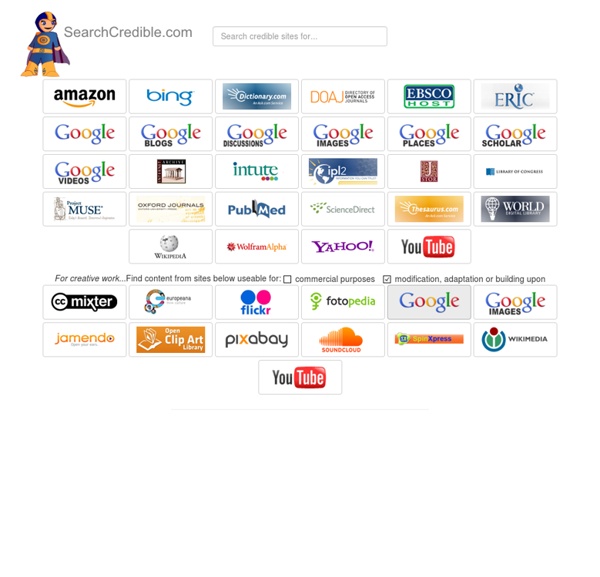



http://www.searchcredible.com/
Related: Academic Research6 of The Best Web Tools for Organizing and Managing Citations, References and Bibliographies April 1, 2015 One of the onerous parts in essay and academic writing is the bibliography section. Managing, organizing and citing references can sometimes be a real challenge especially if you don't keep track of what and who you cite. The last thing you would want after a strenuous writing task is a messy bibliography with one reference missing page numbers the other needs publication date or, worse of all, having to go back to your sources to check for the source of that quotation you included in your conclusion. If you find yourself constantly grappling with problems such as these, the web tools below are absolutely something you might need to consider.
5000+ Resources to Do Just About Anything Online Since May 2007, we've been bringing you resources and tools to be more productive on the web. Due to popular demand, we've brought all these lists together into one gigantic meta-list: 5000+ Resources to Do Just About Anything Online. Enjoy! And don't forget to subscribe to Mashable for the latest web news and resources. 6 Key Ways to Measure Your Blog’s Success - Six essential tools for measuring how your blog is performing. 30+ AJAX-Powered WordPress Plugins - AJAX provides a way to have pages auto-update to reflect new data without page reloads.
How Google Docs' research tool removes drudgery from reports and presentations You’re frantically racing toward a deadline to complete a multi-page report or slideshow presentation, but research is slowing you down. Not tracking down the information so much as the constant bouncing between your work document and web browser, and cycling through the confusing morass of open tabs to find that webpage or image you need. If you use Google’s free office suite, there’s an easier way—a built in research tool that lets you search for the information you need and easily add it to the Google Doc or Google Slide you’re working on without having to leave the page. Here’s how to get started. Access the research tool
Skip Trace Links Are you looking for someone? This is the place to start! There are many resources available on the Internet to help you find people. You will also find several links below pertaining to collections. Research Strategies - AAA Shared Resource Guide - LibGuides at Indiana University-Purdue University Indianapolis Before you start entering any search terms, spend a few minutes trying to think of as many relevant terms and combinations of terms as you can. This will help you to avoid getting stuck in a rut with the first terms that come to mind. If you need help in coming up with terms, you may want to try the "Thesaurus" or "Subject Headings" features in the database you've chosen. Check out the "Help" or "Search Tips" to learn some of the search features specific to that database. Most databases provide similar features, but the methods may vary.
Experimental Real-Time Location Tracking Comes To Google Latitude On Android Google has just released a series of updates for their Google Maps Android application. Two of these updates are useful: Place page reviews and the ability to filter search results. But one of them is really interesting: real-time location updating in Google Latitude. To be clear, this feature is an experimental one that Google is trying out. But if you enable it, your friends on the service will be able to see where you are in real-time (and vice versa, if they enable it too). Previously, location updates through Latitude would occur regularly, but not in real-time.
How to Read a Journal Article Journal articles can be challenging to read, but most contain many of the same components. Once you understand the structure of each article, understanding the content is much simpler. Journal articles normally contain the following parts. For each part, try to identify the following: Location Intelligence Applications For Everyone Mapping and Location Analytics for all Imagine the ability to map your data and test hypothesis without the need for a complex and traditionally expensive GIS, combined with the flexibility to do this in the office, at home, at a client location, on the move and even via a tablet device such as iPad. MAPCITE delivers an extremely powerful toolset that has no reliance on your internal IT teams, internal server connections or requires additional software to be installed. Use cases: Chief Constable visualizing officer movement Epidemiologist mapping disease Global tech company anlayzing distribution channels Bank location based transaction analytics Insurer mapping/analyzing fraud locations Health Analyst understanding the "causes of the causes"
How to (seriously) read a scientific paper Adam Ruben’s tongue-in-cheek column about the common difficulties and frustrations of reading a scientific paper broadly resonated among Science Careers readers. Many of you have come to us asking for more (and more serious) advice on how to make sense of the scientific literature, so we’ve asked a dozen scientists at different career stages and in a broad range of fields to tell us how they do it. Although it is clear that reading scientific papers becomes easier with experience, the stumbling blocks are real, and it is up to each scientist to identify and apply the techniques that work best for them. The responses have been edited for clarity and brevity. How do you approach reading a paper? I start by reading the abstract.